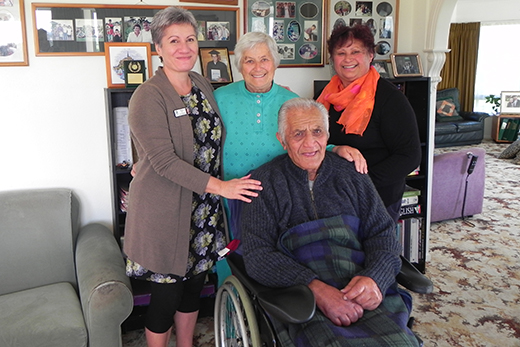Life was turned upside for the Ngatai whānau when patriarch Enoka suffered a stroke which left him unable to walk, speak or swallow late last year.
His family were told Enoka needed 24 hour care in a nursing home – something which was never ever going to be an option for the tightknit Matapihi whānau, says his wife Ataraita.
Bay of Plenty District Health Board nurse practitioner Theresa Ngamoki who supports Ataraita and Tei to care for Enoka at home. Supplied photo.
'Our mokopuna live on our property and Enoka gets great pleasure from them running in and out of the house – it's all part of his recovery,” she says.
Enter nurse practitioner Theresa Ngamoki (Te Whānau-ā-Apanui) whose high level skill base means she's can prescribe medications plus order diagnostic tests – meaning the Ngatai whānau is able to care for Enoka at home.
In the last financial year four Māori nurses gained nurse practitioner status and are all now working in rural high need communities across the Bay of Plenty. Theresa qualified last year after more than twenty–five years working as a registered nurse.
For the past six months she's been doing weekly visits to the Ngatai home.
'It was a huge relief when Theresa started coming into our home. When Dad had his stroke not only was it a shock, it was a steep learning curve. I'm not a nurse. But pretty quickly I've learned how to tube feed, operate hoists and recognise changes in Dad's health,” says Enoka's daughter and main caregiver Tei.
'Theresa has given me confidence. In the beginning it was very stressful. There were daily changes in Dad's health. In the early days we had home based carers but at night we were on our own. I had many sleepless nights, I'm sleeping better now.”
Not only has Theresa provided peace of mind, but her home visits have meant less travel and upheaval to get Enoka to his GP.
Tei explains: 'To get Dad up and into his wheel chair and out the door it's a good three hours. With Theresa coming to our home we don't have to do so many trips.”
Theresa follows a Whānau Ora care model; putting Enoka in the centre and co-ordinating with other agencies for the care he needs. She has also identified and supported the whānau with other health issues.
'You can't ignore the other people in the house,” says Theresa. 'It's a privilege to be invited into someone's home. It wouldn't be right to leave without looking at the health of the household.”
Theresa works for the Western Bay of Plenty PHO specialising in long term conditions. Aside from doing home visits in the more complex cases, she also has a weekly marae-based walk-in general/nurse practitioners clinic.
She sees her role as supporting Māori to access the health services they need in a more timely way.
Theresa's had some rewarding results too, and recalls one patient who was a long-term smoker and from the onset said he wasn't interested in being told yet again to quit.
'I told him, he wanted the half-pai service, and I don't do half-pai,” says Theresa.
'I said I was going to raise the topic but perhaps not at every visit but we both know that quitting smoking is one of the best things he could do for his health. It took a while, but eventually he quit. I was rapt.”
She says everyone wants to be well, but the challenge is to support people to access the health services they need without taking away their sense of control.
'It's important to establish a good rapport and gain trust. Having the cultural knowledge coupled with the health expertise is where I believe I can make the biggest gains,” says Theresa.



3 comments
Well done
Posted on 10-08-2016 09:54 | By Kenworthlogger
Well done to these nurses, but why does it matter what race they are?
Kapai
Posted on 10-08-2016 14:33 | By Tumeke Tauranga
Kia kaha Enoka and whanau! Mauri ora
Race matters
Posted on 16-08-2016 17:54 | By savedbygrace
I think it is very important to respect, accept and honor different cultures and their world view as they have a different approach to the holistic wellbeing of a person. I suggest to study the Maori culture as this would be of great value and is a source to understand why race matters in this case.
Leave a Comment
You must be logged in to make a comment.